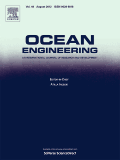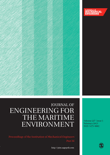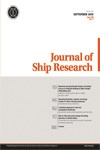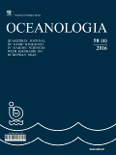
Ocean Engineering
Scope & Guideline
Unraveling the Mysteries of Ocean Dynamics
Introduction
Aims and Scopes
- Marine Structure Design and Analysis:
This area encompasses the design, analysis, and optimization of various marine structures including offshore platforms, floating wind turbines, and breakwaters, focusing on their hydrodynamic performance under environmental loads. - Hydrodynamics and Fluid Mechanics:
Research in this scope emphasizes the study of fluid dynamics related to marine environments, exploring phenomena such as wave interactions, vortex-induced vibrations, and fluid-structure interactions. - Renewable Marine Energy Technologies:
The journal emphasizes innovative developments in marine renewable energy, including wave energy converters, wind turbines, and hybrid energy systems, assessing their performance and integration into existing marine infrastructure. - Environmental Impact and Marine Safety:
This area investigates the environmental implications of marine engineering projects, including risk assessments, the impact of extreme weather events, and the safety of marine operations. - Numerical and Experimental Methods:
The journal promotes the use of advanced numerical simulations and experimental techniques to evaluate marine engineering problems, fostering the development of new methodologies for accurate modeling and analysis.
Trending and Emerging
- Sustainable and Hybrid Marine Energy Systems:
There is a growing emphasis on developing hybrid systems that combine various renewable energy sources, such as wind and wave energy, to enhance efficiency and sustainability in marine energy production. - Advanced Computational Methods and AI Applications:
The integration of artificial intelligence and advanced computational techniques for modeling and simulation is on the rise, enabling more accurate predictions of marine system behaviors and improving design processes. - Climate Change Adaptation Strategies:
Research focusing on the adaptation of marine structures to climate change impacts, such as rising sea levels and increased storm intensity, is becoming increasingly relevant, highlighting the need for resilient engineering solutions. - Innovative Materials and Technologies:
The exploration of new materials, including bio-inspired designs and smart materials, is gaining traction, aiming to enhance the durability and performance of marine structures under extreme conditions. - Environmental Monitoring and Impact Assessment:
There is an increasing focus on the development of methodologies for real-time environmental monitoring and impact assessments, particularly in the context of offshore construction and marine ecosystem protection.
Declining or Waning
- Traditional Ship Design and Stability Analysis:
Research specifically centered on conventional ship design and stability has decreased, likely due to a shift towards more innovative and sustainable maritime solutions and a focus on advanced materials and technologies. - Conventional Coastal Engineering Practices:
Studies focused solely on traditional coastal engineering practices, such as basic seawall design and riprap placement, have waned as the field increasingly adopts more integrated and environmentally conscious approaches. - Static Structural Analysis:
The focus on static analysis of marine structures has diminished in favor of dynamic analyses that account for the complex interactions of marine environments, including wave forces and environmental loading.
Similar Journals

OCEAN DYNAMICS
Advancing Knowledge in Ocean DynamicsOCEAN DYNAMICS is a premier peer-reviewed journal published by Springer Heidelberg, dedicated to advancing the field of oceanography. With an ISSN of 1616-7341 and an E-ISSN of 1616-7228, the journal has established itself as a key resource for researchers and professionals interested in the dynamic processes of the world's oceans. As of 2023, it holds an impressive Q2 category ranking in Oceanography, placing it among the top journals in its field (Rank #34/145, 76th percentile in Earth and Planetary Sciences). Although operating under a traditional publishing model without open access options, OCEAN DYNAMICS continues to provide valuable insights and a platform for innovative research, boasting coverage from 2001 to 2024. Researchers and students alike will benefit from this journal's commitment to showcasing cutting-edge studies that enhance our understanding of oceanographic phenomena.

Ocean and Coastal Research
Empowering researchers to protect our blue planet.Ocean and Coastal Research, published by the Institute Oceanográfico of the University of São Paulo, is an essential academic journal dedicated to advancing the fields of Aquatic Science, Oceanography, and Water Science and Technology. Established in 2020, the journal has quickly become a noteworthy platform contributing to the understanding and sustainable management of marine and coastal ecosystems, with an open access model that promotes the dissemination of critical research findings. Although currently categorized in the fourth quartile across its respective fields in 2023, the journal serves as an emerging repository of valuable insights for researchers, professionals, and students alike, aiming to make impactful discoveries that address contemporary challenges in ocean conservation and resource management. The journal's editorial team is committed to fostering interdisciplinary collaboration and upholding rigorous peer-review standards, thereby ensuring high-quality contributions that reflect the dynamic nature of marine science. With an E-ISSN of 2675-2824, all access to published articles is freely available, supporting global research efforts addressing crucial environmental issues.

Marine Intellectual Technologies
Advancing marine science through innovative research.Marine Intellectual Technologies is an innovative open-access journal dedicated to advancing the field of marine science and technology. Published by the Research Centre Marine Intelligent Technologies, this journal serves as a platform for researchers, professionals, and students to share their latest findings and developments related to marine engineering, oceanography, and aquatic systems. With its commitment to disseminating high-quality research, Marine Intellectual Technologies plays a pivotal role in fostering collaboration and knowledge exchange among the global marine research community. Although the journal's impact factor is currently under review, its focus on embracing cutting-edge technologies and methodologies positions it at the forefront of marine scholarship, allowing for greater insights into sustainable ocean use and marine resource management. Additionally, the accessibility of research published in this journal supports the ongoing educational pursuits of scientists and practitioners alike, ensuring that important marine research is readily available to all.

INTERNATIONAL JOURNAL OF OFFSHORE AND POLAR ENGINEERING
Navigating the Depths of Engineering ExcellenceINTERNATIONAL JOURNAL OF OFFSHORE AND POLAR ENGINEERING, published by the International Society of Offshore and Polar Engineers, is a prominent academic journal dedicated to advancing research in key engineering disciplines such as Civil, Mechanical, and Ocean Engineering. Established in 1991, the journal caters to a global audience, providing an essential platform for disseminating innovative findings and case studies pertinent to offshore and polar environments. With a focus on practical and theoretical applications, the journal ranks in the Q3 category across its relevant fields as of 2023, reflecting its significant contribution to civil and structural engineering, mechanical engineering, and ocean engineering. Although it does not offer open access, its rigorous peer-review process ensures that only high-quality research is published, making it a critical resource for researchers, industry professionals, and students invested in the dynamics of offshore and polar engineering. The journal's commitment to exploring emerging challenges and technological advancements underlines its importance in shaping the future of engineering practices in some of the world's most extreme environments.

Proceedings of the Institution of Mechanical Engineers Part M-Journal of Engineering for the Maritime Environment
Navigating Innovations in Maritime EngineeringProceedings of the Institution of Mechanical Engineers Part M - Journal of Engineering for the Maritime Environment, published by SAGE Publications Ltd, is a leading scholarly journal that addresses critical advancements in the field of maritime engineering. With an ISSN of 1475-0902 and an E-ISSN of 2041-3084, this journal serves as an essential platform for researchers and practitioners alike, disseminating original research, reviews, and case studies relevant to mechanical and ocean engineering. Recognized for its rigorous peer-review process, it currently holds a commendable Q2 ranking in both Mechanical Engineering and Ocean Engineering. The journal's reputation is bolstered by its strategic emphasis on innovative practices and sustainability in maritime environments. By providing a valuable resource for interdisciplinary collaboration, the journal facilitates the intersection of technology and engineering solutions critical for the evolving challenges within the maritime sector. Researchers, professionals, and students alike will find this journal instrumental in keeping abreast of the latest developments, best practices, and future directions in maritime engineering.

Journal of Ocean University of China
Pioneering Research to Harness Oceanic PotentialThe Journal of Ocean University of China, ISSN 1672-5182, is a premier academic journal dedicated to advancing the fields of Ocean Engineering and Oceanography. Published by the esteemed Ocean University of China, the journal serves as a vital platform for researchers, professionals, and students to disseminate groundbreaking findings and foster collaboration in marine science and engineering. With a commitment to quality, the journal currently holds a Q3 ranking in both Ocean Engineering and Oceanography as of 2023, indicating its significant contributions within the scientific community. The journal's scope encompasses a wide range of topics including marine technology, ecological studies, and coastal management, all aimed at enhancing the understanding and utilization of oceanic resources. Although currently not Open Access, it continues to attract submissions from renowned scholars, ensuring a diverse and innovative range of research. By providing access to cutting-edge research and practical insights, the Journal of Ocean University of China plays a critical role in shaping the future of ocean sciences and engineering.

Journal of Naval Architecture and Marine Engineering
Charting the Course for Naval ExcellenceJournal of Naval Architecture and Marine Engineering is a distinguished open-access journal dedicated to advancing the field of marine engineering and naval architecture. Published by the ASSOCIATION OF NAVAL ARCHITECTS & MARINE ENGINEERING in Bangladesh, this journal has been a crucial platform for the dissemination of innovative research and practical applications since its transition to open access in 2007. With an impressive Q2 ranking in Ocean Engineering and a well-respected position within the Scopus rankings, it serves a vital role in connecting researchers and industry professionals. Covering a wide scope of topics from hydrodynamics to ship design and marine environmental protection, the journal invites contributions that enhance the knowledge and technology within the maritime sector. Accessed by a global audience, it is an essential resource for those seeking to make significant advancements in naval engineering.

JOURNAL OF SHIP RESEARCH
Advancing maritime innovation through cutting-edge research.JOURNAL OF SHIP RESEARCH is a premier publication in the field of marine engineering and naval architecture, published by the Society of Naval Architects and Marine Engineers. With a focus on advancing the science and practice of ship design and construction, this journal has become a vital resource for researchers, professionals, and students alike. The journal spans a historical range since its inception in 1969 and provides critical insights and advancements in various related disciplines, highlighted by its strong quartile rankings in Applied Mathematics and Ocean Engineering as of 2023. Although not an open-access publication, it offers valuable research papers that are influential in shaping engineering practices and methodologies across the globe. With an ISSN of 0022-4502 and an E-ISSN of 1542-0604, the journal is available to a broad audience, providing essential knowledge that bridges theory and practical applications in the evolving maritime domain.

MARINE TECHNOLOGY SOCIETY JOURNAL
Advancing Knowledge in Oceanography and EngineeringMARINE TECHNOLOGY SOCIETY JOURNAL, published by the Marine Technology Society, Inc., serves as a critical forum for advancing the field of marine engineering and oceanography. With a rich history dating back to its inception in 1969 and continuing through various converged years until 2024, this journal is recognized for its contributions to the understanding of marine technologies and their applications. It currently holds a notable Q3 ranking in both Ocean Engineering and Oceanography, as per the 2023 metrics, underscoring its significance in these domains. Although access is not open, the journal rigorously assesses and publishes high-quality research articles, technical notes, and reviews that engage a wide readership of researchers, industry professionals, and students alike. With the journal's aim to disseminate innovative findings and foster dialogue within the marine community, it promises to be an essential resource for anyone looking to explore the dynamic field of marine technology.

OCEANOLOGIA
Transforming Ocean Knowledge into ActionOCEANOLOGIA, a distinguished academic journal published by the Polish Academy of Sciences, Institute of Oceanology, serves as a pivotal platform for researchers and professionals in the fields of Aquatic Science, Oceanography, and Ocean Engineering. Established in 1973 and transitioning to Open Access in 2011, this peer-reviewed journal promotes the dissemination of high-quality research across its diverse scope of ocean-related topics, aligning with its commitment to advancing marine science. With a notable impact factor underscored by its positioning in the Q1 and Q2 quartiles of recognized categories, OCEANOLOGIA stands out with impressive Scopus Rankings, including 49/247 in Aquatic Science and 24/105 in Ocean Engineering, reflecting its significance in the global research landscape. The journal's dedication to publishing cutting-edge studies ensures that it continues to influence both academic discourse and practical applications in ocean-related fields, making it an essential resource for students, researchers, and professionals aiming to contribute to the advancement of oceanic studies.